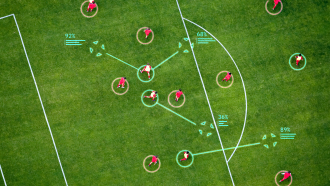-
Move over worm farms, dung beetles can boost plant growth too
Proceedings of the Royal Society B
Dung beetles increase plant growth by an average of 17%, according to a new Aussie analysis of previous research, which puts the beetle boost at a similar level to the increase in growth you get from earthworms. The researcher found that by burying Read more about Move over worm farms, dung beetles can boost plant growth too
Australia; WAThe University of Western Australia|CSIRO -
Our grossest memories are full of smells, tastes and touch
Royal Society Open Science
Our most icky memories, like that time you vomited non-stop, or accidentally drank that off milk, tend to feature our senses of smell, taste or touch, according to Australian research. The study asked people to remember their most disgusting, Read more about Our grossest memories are full of smells, tastes and touch
Australia; NSWMacquarie University -
From the Poles to Everest, the Moon and now the stars
The TOLIMAN mission to discover planets – and perhaps life – around our nearest stellar neighbours in the Centauri system has been awarded a prestigious Explorers Club flag. The TOLIMAN team plans to etch a likeness of the flag onto the Read more about From the Poles to Everest, the Moon and now the stars
Australia; International; NSWThe University of Sydney -
HIV virus elimated by gene editing in a lab
European Congress of Clinical Microbiology and Infectious Diseases
Gene editing has been used to eliminate all traces of HIV from infected immune cells in a laboratory, with the hope that it could one day be used to target the HIV DNA which acts as a reservoir for the virus in people with the condition. The gene Read more about HIV virus elimated by gene editing in a lab
InternationalUniversity of Amsterdam AMC, Netherlands -
A holistic approach is key to improving drought adaptation in crops
Nature Research Earth & Environment
More focus on integrating research into drought tolerance in crops is essential to prevent the threat to global food security, according to international researchers. The team from the Institute for Research and Development (IRD), the International Read more about A holistic approach is key to improving drought adaptation in crops
Australia; International; QLDThe University of Queensland -
'Double jointed'? You may be at a higher risk of long COVID
BMJ Public Health
UK and US researchers say people who are 'double jointed' - a condition formally known as generalised joint hypermobility, may be at a heightened risk of long COVID. The researchers say these bendy people were 30% more likely to not have fully Read more about 'Double jointed'? You may be at a higher risk of long COVID
InternationalBrighton and Sussex Medical School, UK -
Unravelling the mysteries of the presynapse with super resolution microscopy
Nature Communications
Researchers from UQ’s Queensland Brain Institute (QBI) have revealed the pivotal role played by Synapsin 2a proteins in orchestrating the organisation and mobility of synaptic vesicles within live neurons. Researchers from UQ’s Queensland Brain Read more about Unravelling the mysteries of the presynapse with super resolution microscopy
Australia; International; QLDQueensland Brain Institute -
What do team-building exercises do to a group's brain activity?
PLOS Biology
Team-building exercises could help groups of strangers communicate more freely and even synchronise their brain activity, according to international researchers who measured the brain activity of strangers interacting in groups of three. The groups Read more about What do team-building exercises do to a group's brain activity?
InternationalBeijing Normal University, China -
Income and education tied to alcohol abuse
PLOS Medicine
A Swedish study has tied income and education levels to one's likelihood to develop problems related to alcohol abuse. These two factors were consistent despite changes in mental health, genetics and marital status, offering important insight into Read more about Income and education tied to alcohol abuse
InternationalVirginia Commonwealth University, Lund University -
Could artificial intelligence be the future of soccer coaching?
Nature Communications
An artificial intelligence (AI) system named ‘TacticAI’ can predict the outcome of corner kicks and provide realistic and accurate tactical suggestions in soccer matches, according to international researchers, who found that experts from Read more about Could artificial intelligence be the future of soccer coaching?
InternationalGoogle DeepMind, UK










































